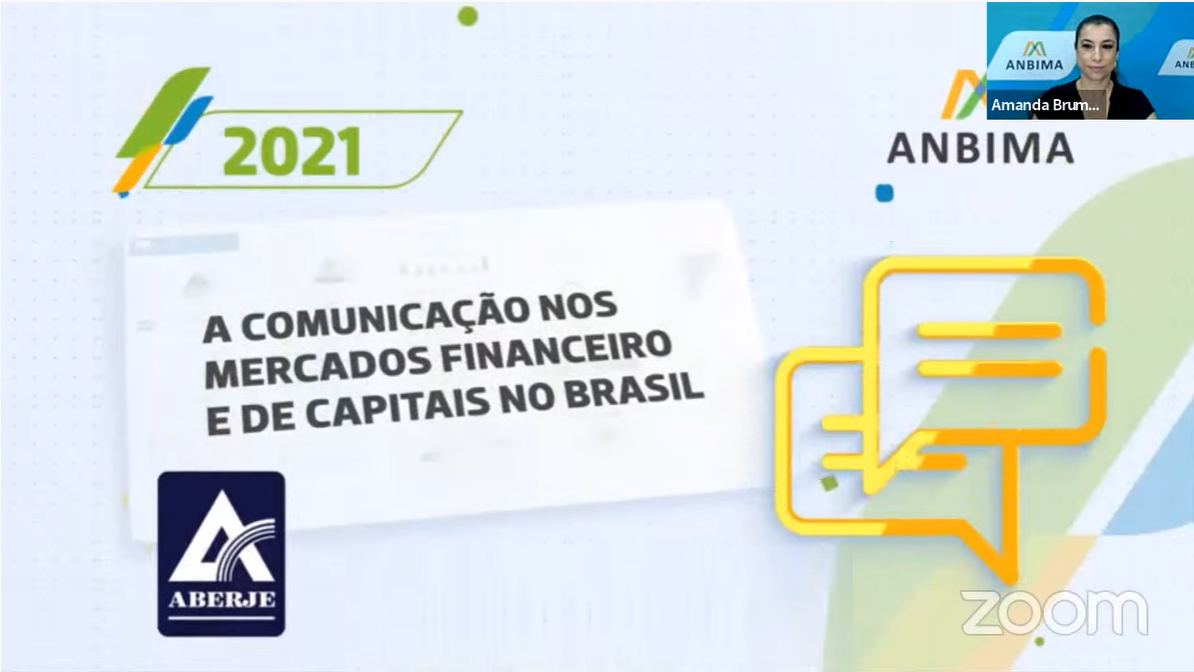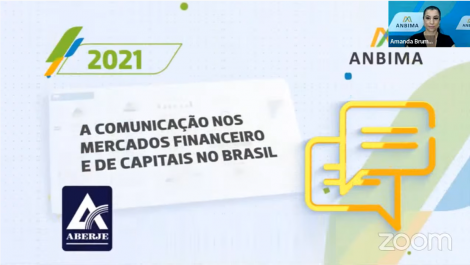Communication in the capital market: financial education and strong regulation are challenges, research shows
Aberje and ANBIMA (Brazilian Association of Financial and Capital Market Entities) have disclosed the survey “Communication in the Financial and Capital Markets in Brazil” carried out with 73 representatives of financial sector companies, which have a net worth of more than 1.2 trillion BRL

It was presented during the first event on Aberje’s 2022 agenda, held on February 3.
Opening the event, Aberje’s executive director, Hamilton dos Santos, shared the Association’s agenda for this year 2022. “Aberje is guided by a fundamental principle, which is associativism. We believe that the union of efforts in favor of a common idea is the basis of any association, which will be democratic whenever its participants see themselves as equals.
Our vision, increasingly consolidated, is to be a think tank of global reference in communication and relationships. This is where our great effort to dialogue with significant associations worldwide comes from, such as the Page Society, the largest PR association in the United States, the Global Alliance [for Public Relations and Communication Management]. We are redefining our participation at Fundacom, an entity dedicated to the development of corporate communication in Ibero-American countries”, says Santos.
The survey found which are the most used channels to reach and dialogue with target audiences and what is the perception of the strategic role of this area by the board, in addition to mapping the challenges and the Communication ecosystem and the main processes that should gain relevance and investments in the coming years. According to the survey, institutions recognize that digital transformation is one of the main challenges in the sector.
The adequacy of language, content, and channels amid the need to reconcile communication and the increased focus on financial education also stand out throughout the survey. Social issues have gained space on the radar of financial institutions as a communication tool and encompass issues ranging from encouraging education to combating social inequality, including data privacy and promoting gender equality.
The debate was moderated by Anbima’s marketing manager Amanda Brum and welcomed Lívia Salvoni, Itaú Unibanco‘s Corporate Communications manager; André Alves, Head of Marketing and Communication at BTG Pactual and Marc Forster, CEO at Western Asset. They represent very different realities within the financial and capital markets and with very different challenges for the Communication area.
Lívia Salvoni emphasizes that there is a lot of information available on the web, hence the challenge of attracting people’s attention and establishing a communication channel. “There are two main points: translating information and managing to gain people’s attention,” she said.
“Among the biggest challenges identified by the research are the difficulty of approaching a complex topic and the lack of financial education of those who receive the message. The challenge is to be relevant, to be perceived as a content generator, in how to position yourself in a market with so much competition,” said Marc Forster.
For André Alves, another challenge is trying to understand the different audiences, the level of knowledge each audience has regarding investments, and their relationship with money. “The relationship with money comes from childhood. In addition to being relevant, we have to simplify information, as there is no financial education in Brazil”, he said.
Regulated Environment
For Forster, market regulation would not be an obstacle to the ability of financial institutions to communicate with investors. “Today, an influencer, for example, is much freer to speak than we are. So the competition is a bit ‘unbalanced.’ This is my view of regulation concerning communication by the financial market. There is space for the financial market to communicate. Investment is a journey. Investment is discipline.”
Salvoni agrees with Foster when he says that, especially now, some things get very loose in this totally digital environment, and I think that regulation is there to help. “Many things contribute to misinformation, and even in this highly regulated environment, we in the communication area have tried to be creative, moving away from traditional media. Here we have learned to use social networks in the best way, more quickly”, he said.
One of the highlights of the survey is that, when respondents were asked what the main gap of the financial and capital market communication teams was, it appeared in the first place and quite often that it is necessary to equip professionals in the area with the knowledge to manage channels and digital communication tools, especially social networks.
“We have brought in a series of professionals with a lot of talent and skills in digital platforms. I think we have an important role here in preventing these professionals from becoming highly specialized in a single type of activity or a single tool. They must understand the entire operation of the bank so that we can analyze the consequences of the work he does for the bank’s communication”, comments Alves, from BTG Pactual.
According to Salvoni, what Itaú Unibanco’s communication team has been doing is trying to map the path of the news and how an article published in traditional media arrives on the social networks of these same media. “This is something we always discuss daily. It’s not just about producing our content for our channels, but we look at the way the news goes so that we can reach our audience”, he says. “The distinction between traditional media and digital channels is increasingly difficult to make,” said Forster.
COMENTÁRIOS:
Destaques
- Sports as an instrument of Change
- Aberje Launches Newsletter with Economic Panorama
- Charting a Path to Responsible Communication: WPRF 2023 Wraps Up in Chennai, India
- Global Alliance AGM elects new Board 2023
- Aberje discloses its positions on the Fake News Bill (PL 2630/2020)
ARTIGOS E COLUNAS
Marcos Santos Maratona da vidaMônica Brissac Thought Leadership: marca pessoal x reputação corporativaLetícia Tavares Liderança comunicadora: um tema sempre atualHamilton dos Santos Comunicação é estratégica na economia contemporâneaCarlos Parente Um salto ornamental para mergulhar no pires




























